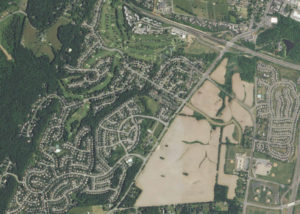
Aerial view of Loudoun County near Washington Dulles International Airport. Would Amazon’s HQ2 beget more of this?
Loudoun County is going for it. An ad hoc committee has come together in the hope of landing the economic development deal of the decade: HQ2, Amazon’s second headquarter complex. “We will be very aggressive in going after this,” said Buddy Rizer, director of Loudoun’s Department of Economic Development. “I truly believe that we’re a contender in this.”
The Loudoun Times-Mirror has the story here.
Let’s hope Loudoun does a better job of exploring the ramifications of a mega-project like Amazon than it did the costs and benefits associated with the Silver Line! (Talk about buyer’s remorse. Loudoun is joining the Washington Metro club just as the transit organization seeks to dun participating states and localities billions of dollars for decades of inept management. Loudoun’s fiscal commitment to heavy rail service is bigger than its boosters ever imagined.)
Amazon has said it is looking for a location within a 30-mile proximity to a city center, with direct access to highways and public transportation options, including bus routes, Metrorail and train, and within 45 minutes of an international airport. As I opined recently, Loudoun has as good a chance as anyone. The county has all the required assets, it’s part of a metro region with the most highly educated workforce in the country, and it has a demonstrated track record of working with Amazon’s cloud-services subsidiary.
But Amazon is seeking massive incentives (as in subsidies and tax breaks), which will suck out much of the tax benefit to any locality hosting the technology giant. There are a couple of key points to remember.
It’s one thing to subsidize a company that helps put the unemployed and under-employed back to work, and another to subsidize a company in a fully employed metropolitan economy. In June, unemployment for the Washington Metropolitan Statistical Area was 3.9%, according to the Bureau of Labor Statistics. That is generally considered full employment, allowing enough slack in the system for a normal movement of people between jobs. However, unemployment in Loudoun and neighboring Fairfax County was 3.2%, which verges on labor shortage. Another neighbor, Prince William County, had 3.5% unemployment.
Where, then, would Amazon find 50,000 workers? Many would commute from other Northern Virginia jurisdictions, overloading already overloaded highways. And many would move into the region from outside the Washington region. It’s not clear that Virginia’s system of taxation can build infrastructure and provide the government services associated with routine economic growth, and that’s when everyone is paying the taxes.
If the dominant employer is not paying taxes, or only a small share of them, then one of two things will happen. Either state/local government will be unable to keep up with the demand on schools, utilities, roads, highways and other infrastructure, or it will have to raise taxes on everyone else. If a company employs one or two thousand, that doesn’t create a regional hardship. If it employs 50,000, it can create a fiscal crisis for the host locality. If it employs 50,000 while perpetuating the sprawling and fiscally untenable land use patterns still embedded in Northern Virginia zoning codes and comprehensive plans, it can bankrupt the entire region.
I’m not saying that Loudoun and Virginia shouldn’t bid for Amazon. The company could cement Northern Virginia’s status as the IT capital of the East Coast and, as a bonus, diversify the regional economy away from the federal government. But state and county officials need to go in with eyes wide open, fully aware of not just the benefits of landing Amazon but the costs.


